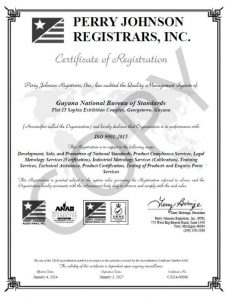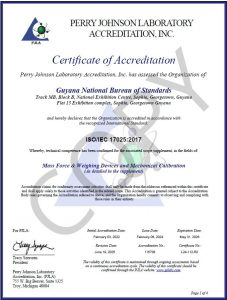Guyana is home to several indigenous communities, each with its own unique traditions, knowledge and craftsmanship. The integration of standards plays a pivotal role in the manufacturing sector and in this regard, the Guyana National Bureau of Standards (GNBS) is pleased to support the Amerindian community through the development of standards.
September is also designated Amerindian Heritage Month and the activities planned to celebrate our indigenous people are ongoing. The theme chosen for this year’s observances is “Sustaining our Cultural Heritage and Identity while Contributing to One Guyana.”
National Standards outline requirements, which can be incorporated when making products to ensure quality, efficiency and consistency. These standards include the Specification for indigenous furniture (bamboo, rattan, wicker and nibbi), Specification for Cassava Bread and the Code of Practice for manufacture of Wooden Craft items.
Products manufactured by indigenous people often possess a unique and authentic appeal; our indigenous people are well known for their fine arts and crafting abilities which have allowed them to produce classy and preferred pieces of furniture from plant materials in their surroundings.
Locally, Regionally and Internationally, these pieces of furniture and other wooden craft items are in high demand and are well priced, especially when they are produced according to recognised standards. In addition, many foods originating from the Amerindians are desired dishes for many locals and visitors. Making these products in a manner that conforms to standards can add value and confidence in their quality and increase demand. The following provides an overview of each standard:
The Specification for indigenous furniture (GYS 509:2013) is a CARICOM Standard, which was adopted by the GNBS. The standard was developed to benefit manufacturers by the harmonization of requirements for the manufacture of various types of furniture, suitable for both domestic and commercial use. It covers material requirements, which are selected for rattan, wicker and nibbi furniture and these shall be characterized by lightness, flexibility, durability and smoothness with no hair-like strands hanging from them. Based on the standard, indigenous furniture shall be constructed with good workmanship components which shall be of quality and uniformity; and the furniture shall remain stable in an upright position when empty.
The Code of practice for manufacture of Wooden Craft items (GCP 31:2010) is also a CARICOM Standard, which establishes the minimum requirements for the manufacture and production of wooden craft items. The standard is focused on performance rather than prescriptive requirements and may be applied to all wooden craft items in the manufacturing stage or at the point of sale to retailers and end consumers. The standard stipulates requirements for materials used in manufacture including wood, adhesives, finishes or finishing material, and hardware. It also includes health, safety, storage, environmental, packaging, and labelling requirements.
Lastly, the Specification for Cassava Bread (GYS 246:2010) specifies requirements for cassava bread and related products, intended for human consumption, obtained from the processing of bitter cassava. The standard offers guidance to makers of the product on quality requirements, contaminants, sampling, packaging, labelling, hygiene and production.
The integration of indigenous standards into Guyana’s manufacturing sector through the GNBS represents a celebration of cultural heritage, an embrace of sustainability and a pathway to economic empowerment.
Copies of these standards are available in GNBS Standards Information Center for purchase and the GNBS can offer technical guidance to those who would like to implement the respective requirements. Stakeholders can propose to the GNBS for the development of other needed standards.
For further information, please contact the GNBS Standardisation Department on Tel: 219-0064-66 or visit our standards portal: gnbsguy.com






